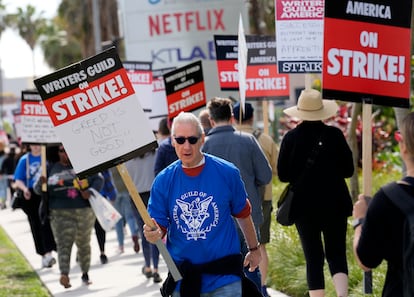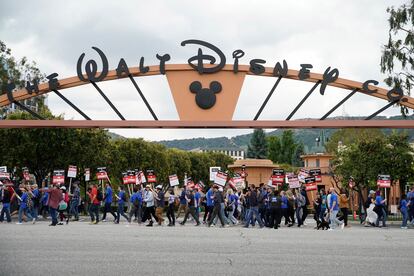Hollywood screenwriters go on strike: ‘We have to hit the studios where it hurts the most: in the wallet’
Writers protest at the gates of the eight major studios to demand better salaries after failed negotiations


Jorge Ramirez-Martinez chose to protest at the gates of Amazon studios on his first day of the Hollywood writers’ strike. The 36-year-old screenwriter was sitting outside the technology giant’s headquarters in Culver City, south of Los Angeles. Alfred Hitchcock’s Citizen Kane and Remember were filmed there, but on Wednesday afternoon, another Hollywood story was being told. About 50 writers formed a picket line to demand better working conditions from the eight major studios that dominate the city. “The studios need to be hit where it hurts the most: in the wallet,” said the writer of Selena and The Blacklist: Redemption, who also brought his little dog King with him to stand up for his rights. The placard he carried read, “Dog food is expensive!”
Two days have passed since the start of the first Hollywood strike in 15 years. The screenwriters met at the studio gates at noon on Tuesday. They wore blue T-shirts emblazoned with the crest of the organization they belong to, the Writers Guild of America (WGA). The protest is not only taking place here, in the cradle of the industry, but also in New York, on the other side of the country. Members of the eastern section of the WGA have also been demonstrating at the studios’ Manhattan offices.
Ramirez-Martinez describes the rapid transformation he has witnessed in the industry. NBC, the television network for which he wrote, offered 20-week contracts to work on one season of television. When he worked for Netflix, they offered the same conditions but for two seasons. “They want [us] to do more in less time,” he says. The scripts, moreover, are created by fewer hands. An eight-episode series on a digital platform is developed by four screenwriters, when the union believes it should be seven.
The atmosphere over the last two days has been rather pessimistic, as neither side expects a quick resolution. On Monday night the screenwriters’ negotiating committee determined that a strike was inevitable after the studios rejected eight of the 14 proposals the union had put on the table. The refusals touched on the most urgent points: raising the minimum number of writers per project and a 6% increase in the amount that screenwriters receive from so-called residuals (the compensation that a writer receives for each broadcast of the projects they have been contracted for). The studios proposed a 2% increase.
“I just find it mind-boggling,” Christine, a member of the actors’ union SAG-AFTRA, which has also joined the protest, said on Wednesday. “It’s been a year of record profits for them, but they don’t want to share them. The studios have complained about the increase in production costs, but as of May 11 (the day the U.S. lifts its health emergency restrictions) they will no longer have to follow the Covid protocols, which had inflated budgets,” she adds.
“It’s an insult that they rejected those proposals,” Ramirez-Martinez adds. “We’re the ones responsible for creating series that they make millions of dollars, prestige, Emmy and Oscar awards on, and they just don’t want to compensate us better.”

“Chill, Netflix”
Hollywood no longer has a creative engine. “Greed is NOT good,” stated one of the banners, a nod to the line Gordon Gekko (played by Michael Douglas) famously delivered in Wall Street. “Alexa will not replace us,” read another sign in front of Jeff Bezos’ audiovisual empire (the studios rejected the proposition that artificial intelligence cannot be used for writing). Another proclaimed: “Writer’s Block!”
“Did you want drama? Here’s a little drama for you!” read the message wielded by Joelle from the Universal Writers Program. In 2007, the year of the last writers’ strike in Hollywood, the screenwriter was working as a producer of reality shows, a genre that boomed when the strike put the brakes on scripted productions. She is now on the other side. She feels the pressure of being in a profession in which she has seen her average salary fall in the last decade despite an increase in the number of series and projects. “Media conglomerates are extending working hours with as little pay as possible. It is simply not sustainable. It’s not in the interest of either party,” she says. One of the recurring themes in the messages held up by the screenwriters was David Zaslav’s salary as CEO of Warner Bros Discovery. The executive earned $250 million in 2021, which could cover the salaries of about 10,000 writers: the number of members the WGA has. “It’s ridiculous that they’re pretending to be poor,” Adam Conover, the actor and trade unionist, said in an interview.
The previous strike lasted from November 2007 for more than 100 days and had an impact on the local economy of more than $2 billion. This year, the protest threatens to become a domino that, if it falls, may end up paralyzing the industry altogether. May 10 is the deadline for the directors’ union to renew its collective bargaining agreement. The guilds hoped that the screenwriters would provide them with a road map for action vis-à-vis the studios in the Alliance of Motion Picture and Television Producers (AMPTP) group.
“2023 was the first year I felt an economic blow,” says Mike Langer, another writer who has joined the protest. “Although there was a lot of work in the last three years, the economy is certainly affecting the industry. But television and movies aren’t going anywhere. So even if there’s a bad economy, the pay should be fair,” adds the American Film Institute graduate.
Sign up for our weekly newsletter to get more English-language news coverage from EL PAÍS USA Edition
Tu suscripción se está usando en otro dispositivo
¿Quieres añadir otro usuario a tu suscripción?
Si continúas leyendo en este dispositivo, no se podrá leer en el otro.
FlechaTu suscripción se está usando en otro dispositivo y solo puedes acceder a EL PAÍS desde un dispositivo a la vez.
Si quieres compartir tu cuenta, cambia tu suscripción a la modalidad Premium, así podrás añadir otro usuario. Cada uno accederá con su propia cuenta de email, lo que os permitirá personalizar vuestra experiencia en EL PAÍS.
¿Tienes una suscripción de empresa? Accede aquí para contratar más cuentas.
En el caso de no saber quién está usando tu cuenta, te recomendamos cambiar tu contraseña aquí.
Si decides continuar compartiendo tu cuenta, este mensaje se mostrará en tu dispositivo y en el de la otra persona que está usando tu cuenta de forma indefinida, afectando a tu experiencia de lectura. Puedes consultar aquí los términos y condiciones de la suscripción digital.








































